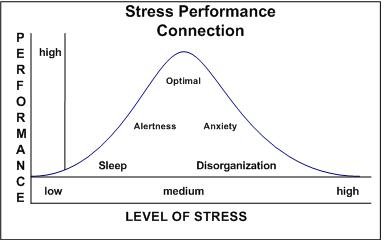Finding The Balance: Managing Stress and Building Resilience
In a world that seems to spin ever faster, the ability to manage stress and build resilience has never been more important. But before we can solve a problem, we must understand it. So what exactly is stress, why do we experience it, and what happens in our bodies and minds when we do?
The Anatomy of Stress
Stress is a physiological and psychological response that's been hardwired into our biology. Originally, it served as an alarm system to alert us to immediate threats, enabling survival. In the brain, stress activates the amygdala, an emotional processing centre, which signals to the hypothalamus to initiate the stress response. For example, the sudden appearance of a predator would trigger our stress response, otherwise known as our "fight or flight" response, flooding our system with adrenaline and cortisol. This hormone release would make our senses sharper and our physical reactions faster—improving our odds of survival in the face of danger. These hormones mobilise energy reserves, quicken your heartbeat, and sharpen your senses, priming you for immediate action.
When in a heightened state of stress, several changes occur at a neurobiological, psychological, and physiological level:
- Neurological Effects: The brain's prefrontal cortex, responsible for rational thinking and decision-making, becomes less effective. This can impair our ability to focus and solve complex problems, and we can become more reactive rather than proactive.
- Psychological Effects: Our ability to regulate our emotions can be weakened, leaving us vulnerable to fluctuations in mood and increased irritability.
- Physiological Effects: The body diverts resources away from long-term maintenance processes like digestion and immune function to address the immediate "threat." Blood pressure increases, muscles tense up, and the heart rate escalates.
In today's fast-paced world, we may not be running from predators like our ancestors, but we face a different kind of threat – the overwhelming pressure of personal responsibilities, deadlines, workplace dynamics, in addition to the incessant onslaught of social media and the never-ending loop of negative news. However, our stress response hasn't evolved to discriminate between a life-threatening predator and a never-ending list of emails; Our bodies respond in a similar manner, instigating a heightened sense of vigilance and readiness for swift action in case of an emergency.
The Nuance of Stress
When we delve into the topic of stress, an initial assumption is often that it is universally negative. However, it's important to recognise that stress, when experienced in manageable doses, can actually have a positive impact.
It is therefore important to differentiate between two kinds of stress: eustress and distress. Eustress is the positive stress that challenges you just enough to push your limits, without overwhelming you. This could be the stress of learning a new skill or preparing for a job interview. Distress, on the other hand, is negative stress that pushes you beyond your ability to cope, which if left unchecked can potentially lead to burnout and various health problems.
Think of a software engineer racing against the clock to fix a critical bug. A moderate level of stress might quicken their pace and sharpen their focus, enabling them to solve the problem more efficiently (eustress). On the other hand, if the stress becomes overwhelming, their performance will likely suffer, possibly leading to errors that could make the problem worse (distress).
The Stress-Performance Curve
This brings us to the Yerkes-Dodson Law, a psychological principle established over a century ago, which suggests that stress can enhance performance, but only up to a certain threshold. Visualise a bell curve: on one end, insufficient stress can result in complacency and a lack of drive. On the other end, excessive stress can overwhelm us, leading to mistakes, health problems, and decreased productivity.
For example, a certain level of stress before an important meeting can sharpen your focus and improve your performance. But if that stress escalates too much, you might find yourself overwhelmed, unable to think clearly or articulate your thoughts cogently.

Allostatic Load: The Cumulative Cost of Stress
While our stress response plays a vital role in facing immediate challenges and can be beneficial in short bursts, continuously triggering this system can result in what is known as 'allostatic load'. This represents the cumulative strain on our body and mind as we continuously adapt to various stressors. Over extended periods, an increased allostatic load can adversely impact both our mental and physical wellbeing.
Identifying Stressors
Understanding what triggers stress in your life is a vital first step for effective management. One of the challenges lies in the multifaceted nature of stressors, which can originate from external sources such as looming deadlines and internal factors like perfectionism and self-beliefs. Research shows that understanding your triggers can empower you to navigate stressful scenarios more effectively, reducing the associated health risks.
One method of identification is self-observation, where you maintain a 'stress diary'. Numerous studies have attested to the utility of journaling in self-awareness and emotional regulation. Record events, thoughts, or circumstances that make you feel stressed, and pay close attention to patterns that emerge over time.
Another useful approach is to utilise easily accessible biofeedback tools such as smartwatches and heart rate monitors. These devices allow you to monitor your physiological responses, providing valuable insights into identifying stressors and managing them effectively.
Strategies for Managing Stress
The good news is that there is an abundance of highly effective strategies available to assist you in managing stress more effectively. These practical and evidence-based strategies provide you with a valuable toolkit to boost your resilience and overall wellbeing.
Sleep
Getting a good night's sleep is not just about physical rest, it is a fundamental pillar for enhancing cognitive abilities and emotional wellness. Research suggests insufficient sleep can exacerbate stress reactions, impair our ability to manage emotions, and hinder cognitive processes such as decision-making and problem-solving. Therefore, prioritising 7-9 hours of quality sleep nightly is not merely important for physical recuperation but is crucial for mental resilience and stress modulation.
Move
While many of us associate exercise primarily with physical health, its impact on stress management is profound. Higher intensity exercise, specifically exercise that leaves you slightly out of breath, is highly effective at promoting the release of endorphins, our body's natural mood elevators. Cardiovascular activities have also been proven to lower cortisol levels, which is the hormone responsible for stress. Adding these forms of exercise to your regular routine can significantly bolster your ability to manage stress effectively.
Eat Well
What you consume can have a direct impact on how you feel. Nutrients like omega-3 fatty acids found in fish, antioxidants in fruits, and complex carbohydrates in whole grains have been shown to have a calming effect on the brain. They help in the production of serotonin, the "feel-good" neurotransmitter, thus becoming an effective tool in stress management.
Be Present
Mindfulness is far more than a buzzword or passing corporate fad—it's a scientifically supported tool for effectively managing stress. There are numerous ways to incorporate mindfulness into your daily routine, whether it's through guided practices or quick, informal rituals. While longer, more formal mindfulness meditation practices can provide significant benefits, you don't always need a formal session. Engaging in simple acts like taking mindful breaths, tuning into your senses, savouring the present moment, or doing a brief body scan throughout the day can also serve as effective tools for relieving stress. These micro-practices can take as little as a few seconds and can be seamlessly integrated into your day and offer practical ways to enhance emotional regulation and reduce stress levels.
Get Out
Immersing yourself in nature has been scientifically proven to have a profound impact on reducing cortisol levels, the body's main stress hormone. In addition to providing psychological advantages, immersing yourself in nature also has a physiological impact. It stimulates the release of endorphins and boosts serotonin levels, known as the "happy hormones," which can enhance your mood and improve your wellbeing. Sunlight can further aid stress management by regulating your circadian rhythm, leading to better sleep, and by promoting the production of Vitamin D, which also contributes to mood and wellbeing.
Unplug
Balancing our always-connected, tech-driven lives with moments of digital detox can improve our ability to handle stress. The constant barrage of notifications, alerts, and email dings can significantly add to our stress levels, negatively impacting our mental wellbeing and ability to concentrate. Taking intentional breaks from technology, even if it's just for a brief period each day, can provide your brain with the much-needed opportunity to reset, recharge, and refocus on what truly matters.
Breathe
Breathing exercises have a potent impact on stress management by directly influencing the autonomic nervous system. Techniques like diaphragmatic breathing and the 4-7-8 method engage the parasympathetic nervous system, promoting relaxation and mitigating the effects of the stress-induced "fight or flight" response. Through conscious control of your breath, you can lower cortisol levels, reduce heart rate, and improve concentration. In short, the breath offers a readily accessible and scientifically supported method to regulate your stress response in real-time.
Reframe
Cognitive reframing offers a powerful tool for reshaping how you engage with stress. By questioning and re-evaluating your outlook on stress triggers, you gain more control over your emotional and physiological responses. This approach invites you to deeply analyse your patterns of thinking, providing you with the chance to challenge and transform any restrictive beliefs you may have about yourself, others, or the situations you encounter.
Notice
Understanding your emotional responses and how they manifest physically can be crucial in managing stress. Paying close attention to sensory experiences—such as touch, smell, and sound—can serve as grounding techniques, making you more present and less susceptible to stress. Practice becoming fully aware of the present moment - noticing what is going on within you, and what is going on around you.
Combine
While no single strategy can eliminate stress, a holistic approach that combines multiple techniques can significantly reduce stress and enhance resilience. This may encompass maintaining a well-balanced diet, engaging in regular exercise, prioritising adequate sleep, and incorporating mindfulness practices into your daily routine. Additionally, it is essential to cultivate a clear understanding and identification of your personal stressors to more effectively manage them.
Emotional Agility and Mindset
Embracing emotional agility and cultivating a growth mindset are pivotal in fostering resilience and effectively managing stress. Being emotionally agile allows us to navigate life's ups and downs with a sense of balance, helping us to adapt and respond more effectively to stressors. A growth mindset, on the other hand, equips us with the belief that challenges are opportunities for growth and development, not insurmountable obstacles. Together, these qualities can not only help us to build mental resilience but also empower us to cope with stress in a more constructive and adaptive manner.
At its core, emotional agility is about navigating life's ups and downs with self-awareness, open-mindedness, and a proactive approach. Dr. Susan David describes emotional agility as the art of being fluid with our emotions, allowing us to respond to life's challenges with a sense of balance and composure. Instead of getting ensnared in negative emotional spirals, we can recognise them, step back, and choose our next course of action. Emotional agility is about navigating life's complexities with a clear and adaptable mind.
The idea of a growth mindset was introduced by Dr. Carol Dweck after extensive research into achievement and success. In essence, it revolves around the belief that our abilities and intelligence can be developed through dedication and hard work. This perspective contrasts with a fixed mindset, where individuals see their qualities as static and unchangeable.
Dweck's findings illuminate the transformative power of the growth mindset. Those who adopt this mindset view challenges not as threats but as opportunities to evolve and learn. Failures aren't reflections of inadequacy but are lessons that pave the way for growth.
The Power of Perspective
Mastering emotional agility and adopting a growth mindset share a foundational element: the importance of perspective. Our ability to step back and look at the broader context, to discern what can be changed and what must be accepted, is crucial to our wellbeing.
Developing the skill of adjusting our perspective empowers us to uncover hidden opportunities amidst challenging circumstances. It can help provide us with some clarity to identify our personal boundaries and understand where we have the power to make a difference. Moreover, by embracing a balanced perspective, we can release our grip on circumstances beyond our control, freeing ourselves from unnecessary stress and emotional turmoil.
Navigating the Complexities of Modern Life
In our fast-paced world, the challenges we face often push us to our limits, testing our resilience and mental fortitude. While the origins of stress find their roots in our evolutionary past, it's the modern incarnations of these stressors, and our responses to them, that can have such a profound impact on our wellbeing today.
Understanding our stress triggers and using tailored strategies to manage them, are foundational to enhancing our resilience and overall wellbeing. It's not merely about dodging the emotional and physical toll of stress; it's about equipping ourselves with the tools to navigate life's complexities more effectively. By honing in on what we can change and letting go of what we can't, we shift our energy toward constructive growth, setting the stage for a healthier, more resilient future.
When it comes to navigating the complexities of modern life, the ability to understand and manage stress is not just a skill, but an essential component for long-term wellbeing.
Share this
You May Also Like
These Related Stories

How To Manage Stress

Happiness, Resilience and Managing Stress




